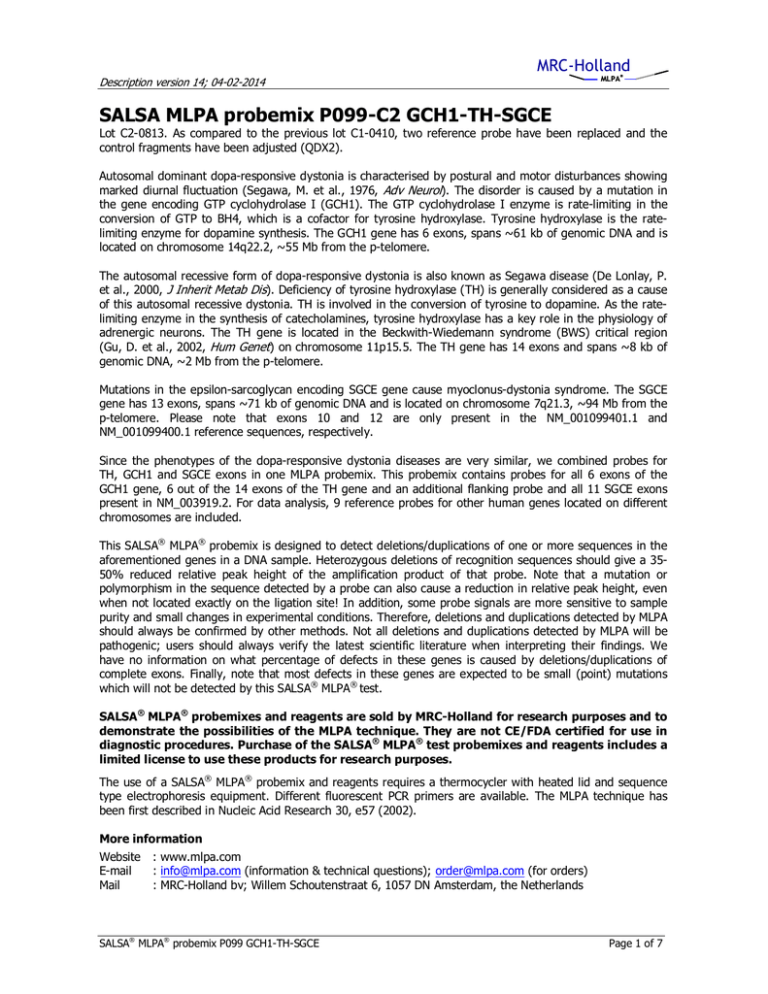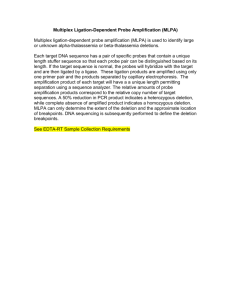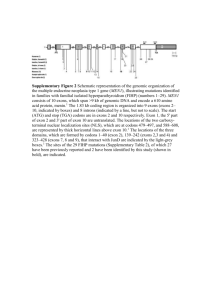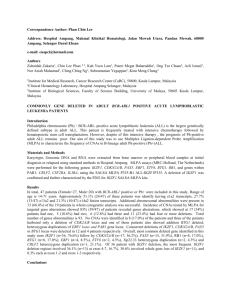Product description P099-C2-0813 GCH1-TH-SGCE - MRC
advertisement

MRC-Holland ® Description version 14; 04-02-2014 MLPA SALSA MLPA probemix P099-C2 GCH1-TH-SGCE Lot C2-0813. As compared to the previous lot C1-0410, two reference probe have been replaced and the control fragments have been adjusted (QDX2). Autosomal dominant dopa-responsive dystonia is characterised by postural and motor disturbances showing marked diurnal fluctuation (Segawa, M. et al., 1976, Adv Neurol). The disorder is caused by a mutation in the gene encoding GTP cyclohydrolase I (GCH1). The GTP cyclohydrolase I enzyme is rate-limiting in the conversion of GTP to BH4, which is a cofactor for tyrosine hydroxylase. Tyrosine hydroxylase is the ratelimiting enzyme for dopamine synthesis. The GCH1 gene has 6 exons, spans ~61 kb of genomic DNA and is located on chromosome 14q22.2, ~55 Mb from the p-telomere. The autosomal recessive form of dopa-responsive dystonia is also known as Segawa disease (De Lonlay, P. et al., 2000, J Inherit Metab Dis). Deficiency of tyrosine hydroxylase (TH) is generally considered as a cause of this autosomal recessive dystonia. TH is involved in the conversion of tyrosine to dopamine. As the ratelimiting enzyme in the synthesis of catecholamines, tyrosine hydroxylase has a key role in the physiology of adrenergic neurons. The TH gene is located in the Beckwith-Wiedemann syndrome (BWS) critical region (Gu, D. et al., 2002, Hum Genet) on chromosome 11p15.5. The TH gene has 14 exons and spans ~8 kb of genomic DNA, ~2 Mb from the p-telomere. Mutations in the epsilon-sarcoglycan encoding SGCE gene cause myoclonus-dystonia syndrome. The SGCE gene has 13 exons, spans ~71 kb of genomic DNA and is located on chromosome 7q21.3, ~94 Mb from the p-telomere. Please note that exons 10 and 12 are only present in the NM_001099401.1 and NM_001099400.1 reference sequences, respectively. Since the phenotypes of the dopa-responsive dystonia diseases are very similar, we combined probes for TH, GCH1 and SGCE exons in one MLPA probemix. This probemix contains probes for all 6 exons of the GCH1 gene, 6 out of the 14 exons of the TH gene and an additional flanking probe and all 11 SGCE exons present in NM_003919.2. For data analysis, 9 reference probes for other human genes located on different chromosomes are included. This SALSA® MLPA® probemix is designed to detect deletions/duplications of one or more sequences in the aforementioned genes in a DNA sample. Heterozygous deletions of recognition sequences should give a 3550% reduced relative peak height of the amplification product of that probe. Note that a mutation or polymorphism in the sequence detected by a probe can also cause a reduction in relative peak height, even when not located exactly on the ligation site! In addition, some probe signals are more sensitive to sample purity and small changes in experimental conditions. Therefore, deletions and duplications detected by MLPA should always be confirmed by other methods. Not all deletions and duplications detected by MLPA will be pathogenic; users should always verify the latest scientific literature when interpreting their findings. We have no information on what percentage of defects in these genes is caused by deletions/duplications of complete exons. Finally, note that most defects in these genes are expected to be small (point) mutations which will not be detected by this SALSA® MLPA® test. SALSA® MLPA® probemixes and reagents are sold by MRC-Holland for research purposes and to demonstrate the possibilities of the MLPA technique. They are not CE/FDA certified for use in diagnostic procedures. Purchase of the SALSA® MLPA® test probemixes and reagents includes a limited license to use these products for research purposes. The use of a SALSA® MLPA® probemix and reagents requires a thermocycler with heated lid and sequence type electrophoresis equipment. Different fluorescent PCR primers are available. The MLPA technique has been first described in Nucleic Acid Research 30, e57 (2002). More information Website E-mail Mail : www.mlpa.com : info@mlpa.com (information & technical questions); order@mlpa.com (for orders) : MRC-Holland bv; Willem Schoutenstraat 6, 1057 DN Amsterdam, the Netherlands SALSA MLPA probemix P099 GCH1-TH-SGCE Page 1 of 7 MRC-Holland ® Description version 14; 04-02-2014 MLPA References of SALSA® MLPA® probemix P099 GCH1-TH-SGCE Ling, H. et al., 2011. An intragenic duplication in guanosine triphosphate cyclohydrolase-1 gene in a doparesponsive dystonia family. Mov Disord. 26:905-9 Steinberger, D. et al., 2007. Utility of MLPA in deletion analysis of GCH1 in dopa-responsive dystonia. Neurogenetics. 8:51-55. Grϋnewald, A. et al., 2008. Myoclonus-dystonia: significance of large SGCE deletions. Hum Mutat. 29:3312. Liu, X. et al., 2010. GCH1 mutation and clinical study of Chinese patients with dopa-responsive dystonia. Mov Disord. 25:447-51. Wu-Chou, Y. H. et al., 2010. High frequency of multiexonic deletion of the GCH1 gene in a Taiwanese cohort of dopa-response dystonia. Am J Med Genet B Neuropsychiatr Genet. 153B:903-908. Data analysis The P099-C2 GCH1-TH-SGCE probemix contains 36 MLPA probes with amplification products between 130 and 418 nt. In addition, it contains 9 control fragments generating an amplification product smaller than 120 nt: four DNA Quantity fragments (Q-fragments) at 64-70-76-82 nt, three DNA denaturation control fragments (D-fragments) at 88-92-96 nt, one X-fragment at 100 nt and one Y-fragment at 105 nt. More information on how to interpret observations on these control fragments can be found in the MLPA protocol. Data generated by this probemix can first be normalised intra-sample by dividing the peak height of each probe’s amplification product by the total peak height of only the reference probes in the probemix (block normalisation). Secondly, inter-sample normalisation can be achieved by dividing the intra-normalized probe ratio in a sample by the average intra-normalised probe ratio of all reference samples. Please note that this type of normalisation assumes no changes occurred in the genomic regions recognised by the reference probes. Data normalisation should be performed within one experiment. Only samples purified by the same method should be compared. Confirmation of most exons deletions and amplifications can be done by e.g. Southern blotting, long range PCR, qPCR, FISH. Note that Coffalyser, the MLPA analysis tool developed at MRC-Holland, can be downloaded free of charge from our website www.mlpa.com. Many copy number alterations in healthy individuals are described in the database of genomic variants: http://dgv.tcag.ca/dgv/app/home. For example, a duplication of a complete gene might not be pathogenic, while a partial duplication or a deletion may result in disease. For some genes, certain in-frame deletions may result in a very mild, or no disease. Copy number changes of reference probes are unlikely to be the cause of the condition tested for. Users should always verify the latest scientific literature when interpreting their findings. This probemix was developed at MRC-Holland. Info/remarks/suggestions for improvement: info@mlpa.com. SALSA MLPA probemix P099 GCH1-TH-SGCE Page 2 of 7 MRC-Holland ® MLPA Description version 14; 04-02-2014 Table 1. SALSA MLPA P099-C2 GCH1-TH-SGCE probemix Length (nt) 64-70-76-82 88-92-96 100 105 130 136 142 148 ¬ 153 # 159 165 171 178 185 191 202 210 218 229 239 246 ¥ # 256 265 274 283 290 298 310 * 319 328 337 346 * 355 # 364 371 ¥ 382 391 401 409 418 SALSA MLPA probe reference Chromosomal position TH GCH1 SGCE Q-fragments: DNA quantity; only visible with less than 100 ng sample DNA D-fragments: Low signal of 88 or 96 nt fragment indicates incomplete denaturation X-fragment: Specific for the X chromosome Y-fragment: Specific for the Y chromosome Reference probe 00797-L00463 Reference probe 11992-L12820 GCH1 probe 04619-L03894 IGF2AS probe 02218-L01712 SGCE probe 07004-L07150 Reference probe 02597-L02068 TH probe 03143-L02611 SGCE probe 07892-L07706 GCH1 probe 03139-L02607 TH probe 03144-L03587 SGCE probe 07005-L07151 GCH1 probe 03140-L02608 TH probe 03145-L02613 SGCE probe 03382-L05789 GCH1 probe 03141-L02609 TH probe 03146-L14800 SGCE probe 07003-L26246 GCH1 probe 03682-L03586 TH probe 03147-L02615 SGCE probe 07009-L07153 GCH1 probe 03686-L03101 SGCE probe 03384-L05790 TH probe 03148-L05945 Reference probe 13275-L14608 SGCE probe 03385-L02778 Reference probe 09571-L10025 SGCE probe 07002-L06608 Reference probe 14980-L16716 SGCE probe 03386-L02779 GCH1 probe 15131-L16901 SGCE probe 19656-L26248 SGCE probe 07891-L07705 Reference probe 01795-L01358 SGCE probe 07931-L06613 Reference probe 02669-L02136 Reference probe 12930-L14081 5q31 8p11 Exon 1 11p15 Exon 3 5q35 Exon 1 Exon 9 Exon 2 Exon 3 Exon 4 Exon 3 Exon 4 Exon 1 Exon 5 Exon 8 Exon 2 Exon 1 Exon 12 Exon 13 (11) Exon 6 Exon 5 Exon 14 1p21 Exon 7 22q13 Exon 1 6q22 Exon 11 (10) Exon 4 Exon 6 Exon 8 13q14 Exon 8 11q22 2p23 * New in version C2 (from lot C2-0813 onwards). ¥ Changed in version C2 (from lot C2-0813 onwards). Small change in length, no change in sequence detected. ¬ Flanking probe. Included to facilitate determination of the extend of a deletion / duplication. Copy number alterations of flanking and reference probes are unlikely to be related to the condition being tested. # The following probes have a validated SNP on their ligation site: 246 nt probe rs11548284; 153 nt probe rs200979763; 355 nt probe rs148126317. In case of an apparent deletion it is recommended to sequence the target site. The SGCE exon numbering has changed. From description version 08 onwards, we have adopted the NCBI exon numbering that is present in the NM_ sequences for the SGCE gene. This exon numbering used here may differ from literature! The exon numbering used in previous versions of this product description can be found between brackets in Table 1 & 2. SALSA MLPA probemix P099 GCH1-TH-SGCE Page 3 of 7 MRC-Holland ® MLPA Description version 14; 04-02-2014 Note: Exon numbering used here may differ from literature! Please notify us of any mistakes. The identity of the genes detected by the reference probes is available on request: info@mlpa.com. Table 2. P099 probes arranged according to chromosomal location Table 2a. GCH1 gene Length (nt) SALSA MLPA probe 142 256 178 202 364 229 283 04619-L03894 03682-L03586 03139-L02607 03140-L02608 15131-L16901 03141-L02609 03686-L03101 GCH1 exon Ligation site NM_000161.2 start codon 162-164 (ex 1) Exon 1 Exon 1 Exon 2 Exon 3 Exon 4 Exon 5 Exon 6 188 nt before exon 1 360-361 569-570 626-627 61 nt before exon 4 751-752 904-905 Partial sequence (24 nt adjacent Distance to to ligation site) next probe CGCCCTTTTCCT-TCCCTCCCTGCG ATAACGAGCTGA-ACCTCCCTAACC AAGGACATAGAC-ATGTTTTCCATG GTCCATATTGGT-TATCTTCCTAAC GTTTTATGAGGA-AGGCTTATCAAT CACGGAAGCCTT-GCGGCCTGCTGG CCTGACTCTCAT-TAGGAGCTGAGC 0.6 37.1 5.6 12.6 1.4 1.8 kb kb kb kb kb kb stop codon 912-914 (ex 6) The NM_000161.2 sequence represents transcript variant 1 and is a reference standard in the NCBI RefSeqGene project. Table 2b. TH gene Length (nt) SALSA MLPA probe TH exon Ligation site NM_199292.2 165 185 210 239 265 298 03143-L02611 03144-L03587 03145-L02613 03146-L14800 03147-L02615 03148-L05945 start codon 20-22 (ex 1) Exon 1 Exon 3 Exon 4 Exon 8 Exon 12 Exon 14 59-60 224-225 470-471 877-878 1251-1252 1467-1468 148 ¬ 02218-L01712 IGF2AS gene stop codon 1604-1606 (ex 14) Partial sequence (24 nt adjacent Distance to to ligation site) next probe AGGCCAAGGGCT-TCCGCAGGGCCG TCATTGGGCGCA-GGCAGAGCCTCA GGCCCGCCCAGA-GGCCGCGAGCTG CTGGAGGCCTTT-GCTTTGCTGGAG CGGGCTGTGTAA-GCAGAACGGGGA CTCACGCATCCA-GCGCCCCTTCTC 1.9 1.2 1.7 1.2 1.4 20.2 kb kb kb kb kb kb GGGTTTCTTCCT-TACACCCGGACG The NM_199292.2 sequence represents transcript variant 1 and is a reference standard in the NCBI RefSeqGene project. Table 2c. SGCE gene Length (nt) SALSA MLPA probe 218 337 246 ¥ # 153 # 191 290 371 ¥ 319 401 382 171 03382-L05789 07002-L06608 07003-L26246 07004-L07150 07005-L07151 03384-L05790 19656-L26248 03385-L02778 07931-L06613 07891-L07705 07892-L07706 No probe Exon 10 355 # 03386-L02779 Exon 11 (10) No probe Exon 12 07009-L07153 Exon 13 (11) 274 SGCE exon Ligation site NM_003919.2 start codon 112-114 (ex 1) Exon 1 Exon 1 Exon 2 Exon 3 Exon 4 Exon 5 Exon 6 Exon 7 Exon 8 Exon 8 Exon 9 158-159 564 nt after exon 1 257-256 reverse 405-404 reverse 206 nt after exon 4 671-672 797-798 1048-1049 96 nt before exon 8 1174-1175 1339-1340 Partial sequence (24 nt adjacent Distance to to ligation site) next probe CTGTGCTTGGAC-GGGACAGGGTCG GAAATCTCGGTT-TTCTTCGGTTTT ATGGGTATACAT-TCCGATCGGAGT CGAAGCCATCCA-GGTCGGTCTGGG AACTCAGATAGG-AAGCCAAACAGA TCTTGGCGCAGT-GAAAAATGTGTG GGTTGGTGCAGA-TGTCCCGTTTTC AAAGCAGAGACT-ATTACACGGATT GTGACAATGTCA-GCATTTCCACAT TGCAAACACCAG-AGTAAGTGTCTT ATGATAGCACAA-ACATGCCATTGA 0.6 25.6 1.5 5.2 4.3 15.4 2.7 0.9 0.1 0.9 10.1 kb kb kb kb kb kb kb kb kb kb kb Only present in NM_001099401.1 1392-1391 reverse GTCTGCTGTTGG-GGAATCTGAGTC 3.2 kb Only present in NM_001099400.1 1418-1417 reverse TTCTTCAGGGAT-ACCATTTACCTG stop codon 1423-1425 (ex 13) ¥ Changed in version C2 (from lot C2-0813 onwards). Small change in length, no change in sequence detected. SALSA MLPA probemix P099 GCH1-TH-SGCE Page 4 of 7 MRC-Holland ® Description version 14; 04-02-2014 MLPA ¬ Flanking probe. Included to facilitate determination of the extent of a deletion / duplication. Copy number alterations of flanking and reference probes are unlikely to be related to the condition tested. # The following probes have a validated SNP on their ligation site: 246 nt probe rs11548284; 153 nt probe rs200979763; 355 nt probe rs148126317. In case of an apparent deletion it is recommended to sequence the target site. The NM_003919.2 sequence represents transcript variant 2 and is a reference standard in the NCBI RefSeqGene project. The SGCE exon numbering has changed. From description version 08 onwards, we have adopted the NCBI exon numbering that is present in the NM_003919.2 sequence for the SGCE gene. This exon numbering used here may differ from literature! The exon numbering used in previous versions of this product description can be found between brackets in Table 1 & 2. Note: Exon numbering used here may differ from literature! Please notify us of any mistakes. Complete probe sequences are available on request: info@mlpa.com. SALSA MLPA probemix P099 GCH1-TH-SGCE Page 5 of 7 MRC-Holland ® MLPA Description version 14; 04-02-2014 SALSA MLPA probemix P099-C2 GCH1-TH-SGCE sample picture 100000 128.23 90000 96.39 86.00 80000 246.86 70000 170.94 163.88 91.14 60000 105.51 140.26 157.60 134.14 152.16 145.74 217.86 210.13 371.14 202.09 177.92 228.65 238.90 254.83 50000 288.93 264.06 317.52 364.08 297.77 327.65 40000 409.70 185.02 191.22 310.15 281.81 274.58 100.66 345.60 336.52 354.85 419.03 380.36 401.00 391.08 30000 D ye S ign a l 20000 10000 0 50 100 150 200 250 Size (nt) 300 350 400 450 Figure 1. Capillary electrophoresis pattern from a sample of approximately 50 ng human male control DNA analysed with SALSA MLPA probemix P099-C2 GCH1-TH-SGCE (lot C2-0813). Implemented Changes – compared to the previous product description version(s). Version 14 (53) - Product description adapted to a new lot (lot number added, small changes in Table 1 and Table 2, new picture included). - Warning added on SNPs being present on the ligation site of the 246 nt 153 nt and 355 nt probes Version 13 (48) - Warning about 210nt probe removed from product description. Non-specific peak formation by this probe is prevented by new PCR primer mix and One-tube protocol. Version 12 (48) - Electropherogram pictures using the new MLPA buffer (introduced in December 2012) added. Version 11 (48) - Small correction of chromosomal locations in Table 1 and 2. Various minor textual changes. Various minor layout changes. Remark on RefSeqGene standard and transcript variant added below Table 2. Version 10 (46) - Warning added in Table 1, 210 nt probe 03145-L02613. - New reference added on page 2. - Minor textual and layout changes on page 1 and 2. Version 09 (46) - Extra information added regarding the exon numbering of SGCE. Exons 10 and 12 are present in other transcript variants and no probes are included for these exons in this probemix. Version 08 (45) - Product description adapted to a new product version (version number changed, lot number added, small changes in Table 1 and Table 2, new picture included). SALSA MLPA probemix P099 GCH1-TH-SGCE Page 6 of 7 MRC-Holland ® Description version 14; 04-02-2014 MLPA - Small changes of probe lengths in Table 1 and 2 in order to better reflect the true lengths of the amplification products. - Sentence “when only small numbers of samples are tested, visual comparison of peak profiles should be sufficient” removed from data analysis section - Ligation sites updated according to new version of the NM_reference sequence. SALSA MLPA probemix P099 GCH1-TH-SGCE Page 7 of 7



